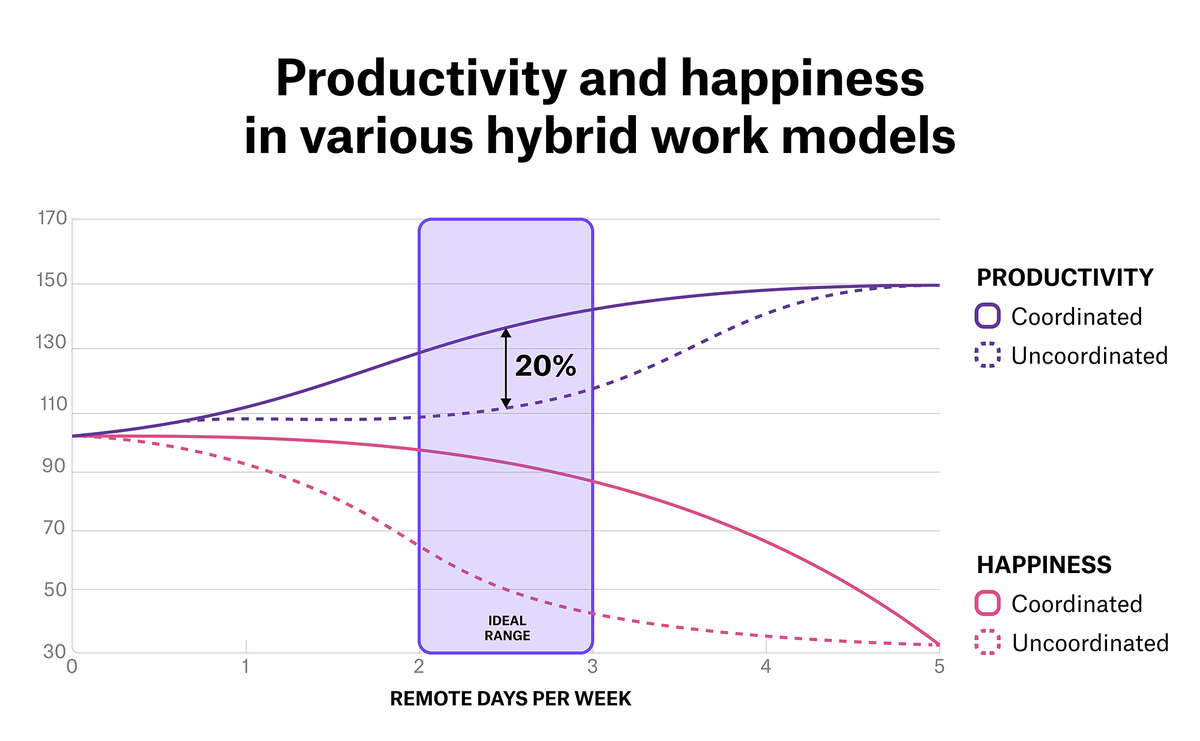Maximising productivity for hybrid enterprises: the deskbird advantage
Sponsored by deskbirdBring productivity, efficiency and employee satisfaction to a new level with deskbird, the cutting-edge solution for coordinated hybrid work.

It’s no secret that the nature of work has changed significantly in recent times. The focus has shifted to adaptability and flexibility, making hybrid work the new norm.
However, simply introducing a flexible work model does not equal success. Quite the opposite: a bad implementation of the hybrid work model leads to worse performance and unhappy employees. This transition requires adjustments for businesses and employees to reap its benefits.
The benefits of co-ordinated hybrid work
Incorporating a customised and well-organised hybrid approach becomes crucial to ensure maximum effectiveness.
A recent Gartner study on workplace predictions suggests that organisations must introduce a flexible work model to attract and retain talent, and that they need to structure their hybrid work model properly. Faulty implementation and lack of co-ordination in hybrid work impact employee performance and dissatisfaction.
On the other hand, targeted planning and a well-structured model can significantly boost productivity and work morale. This is especially important considering that in 2023, an estimated 30 per cent of employees worked remotely at least part-time (a significant increase from only 18 per cent in 2019).
Additionally, a study by BCG indicated that companies that embrace flexible work have seen productivity boosts ranging from 15 to 40 per cent.
The best of both worlds
Although hybrid work has its benefits, there are still significant challenges when it comes to implementing it. According to a Buffer survey, 98 per cent of remote workers value flexibility in their work environment. However, the survey also points out challenges such as collaboration difficulties and feelings of isolation, underscoring the importance of a well-structured hybrid model.
The essence of the hybrid model lies here: in its ability to combine the best elements of remote and in-office work. If companies manage and co-ordinate their hybrid work effectively, they can increase weekly productivity by up to 20 per cent and happiness by up to 40 per cent. This is not just a statistical improvement; it represents unlocking your team’s full potential and reimagining traditional work paradigms.
So, what’s the secret recipe for a well-coordinated hybrid work model?

Maximising productivity and happiness
An integrated hybrid model can help teams communicate and collaborate more effectively and connect more easily. With deskbird by your side, creating a well-structured hybrid model will be a breeze: your team can strategically schedule in-office days and see who is in the office and when improving real-time co-operation. They can attend office events and schedule meetings, and you will have access to all the data on occupancy and attendance (to manage your office space better and avoid extra costs).
Our study shows that periodic office presence should not be underestimated. Psychological factors play a crucial role in employee happiness. Teams that rarely meet in the office may feel isolated and less engaged, despite the benefits of flexibility.
During our analysis, we also discovered that two to three remote days per week can optimise productivity and employee wellbeing. Of course, these figures are guidelines, and each team and company has different needs. But crafting a hybrid work model that reflects those needs is crucial.
More efficiency through data analysis
Solutions such as deskbird not only simplify the scheduling and co-ordination of hybrid work. Workplace and facility managers can also analyse the booking data captured in the tool, forecasting how offices and resources are likely to be used. This helps identify which areas, rooms or desks are most frequently used and which days the office will be bustling, improving resource management and space optimisation.
Using digital tools makes it simpler to decide when the cafeteria should provide a broader food selection or when less-used areas should remain closed to save on cleaning or energy costs. These tools assist in planning and using resources and the entire office space more efficiently. For example, they can be used to reduce areas or redesign them based on the employee’s requirements.
deskbird also plays a key role in building employees’ sense of community and belonging. The ability to quickly see who is in the office encourages spontaneous meetings and collaborations, which are crucial to maintaining company culture.
Step into the future of work with deskbird
Adopting a hybrid work model requires careful planning, strategic co-ordination, and a solid technical foundation. Organisations can enhance the benefits of hybrid work by keeping employee satisfaction and productivity centre-stage. With the help of deskbird, implementing the hybrid work model has never been easier: employees can book their desk, room or other resource in just two clicks and see in real time when their colleagues and best buddies are in the office.
This enables co-ordination of at-home and in-office days and establishes a vibrant workplace community where people collaborate, brainstorm and share a common goal.
Workplace management apps not only facilitate collaboration but also strengthen the social structure of the workplace and the sense of community and belonging, which are essential for a strong corporate culture and talent retention.
With deskbird, companies benefit from various advantages – from increased productivity and more efficient resource planning to improved employee wellbeing. It’s a game-changer on the way to the hybrid work world of tomorrow!

Business Reporter Team
Most Viewed
Winston House, 3rd Floor, Units 306-309, 2-4 Dollis Park, London, N3 1HF
23-29 Hendon Lane, London, N3 1RT
020 8349 4363
© 2025, Lyonsdown Limited. Business Reporter® is a registered trademark of Lyonsdown Ltd. VAT registration number: 830519543